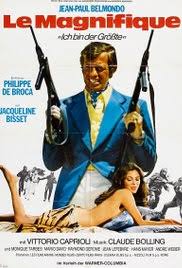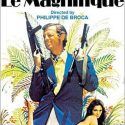Week One: The Man from Acapulco (Le Magnifique): The bending of reality

My first reaction to The Man from Acapulco (Le Magnifique) (1973), directed by Philippe de Broca, was of fantasy meets reality. It is a movie with different layers but those layers, like many other movies, need to be peel with care before they reveal what they have to tell. At first, The Man from Acapulco seems to be a French version of James Bond, charged with many shades of humor and parody against the tropical Mexican landscape. On the other hand, this movie also resembles the Pink Panther because it plays with a clumsy but agile detective, Bob Saint-Clar, a fiction character, who is involved in all of the action scenes which later are explain to be the creation of the other main character: François Merlin, the writer. In a sense, The Man from Acapulco is a movie about the creation of reality based on fantasy. A French writer writes about Acapulco, a place he has never been to, but wishes he could be there in person in order to escape the cosmopolitan city of Paris. Hence, Merlin uses the genre of action and adventure literature to create fictional characters who can travel to remote places (away from civilized France) to solve miseries and to live a more exciting live.
There is something very important about this movie because it explains the power of writing. But beyond creating stories and imagining fictional heroes saving the pretty girl, this movie also showcases the struggles of the creative process of writing itself. Here is where I relate to the movie and to the difficulty of writing something of value. This is not to say that the movie cannot be analyzed in other ways. For instance, one of the elements of the movie, and perhaps an empowering element for Merlin as a writer, is that he becomes some sort of semi-god full of vengeance. Case in point, Merlin punishes or rewards the people who live in his building (Christine) or come to his apartment (Charron, Mrs. Berger, the electrician and the plumber), depending on how his state of mind is at the moment. If the electrician does not fix his cable problem at home, then Merlin makes him an evil villain in his book. Hence, the power of writing and his personal power as a character is to use his talent to create other fictional charters which makes his story line very successful. But the vengeance part does not end in the fictional section of the movie. For example, Merlin also punishes Christine when he thinks she’s been cheating on him with his editor. During this final scene, Merlin’s male ego is hurt so much that he leaves Christine outside of his apartment to sleep on the floor just because he thinks she has betrayed him. Not to mention, the many times Tatiana, the fictional double character of Christine, who suffers multiple violent rapes many times over at the hands of the military as a punishment.
Another element which is important in The Men from Acapulco is the breaking down or failure of the typewriter machine. This event allows the filmmaker to ‘break’ the fantasy/reality continuum of the scene and to tell the viewer there are to different worlds being presented here. One is the the word of reality of Merlin and the other is the fantastic world of Bob Saint-Cla, the action hero. Now, the viewer can identify that Merlin is a writer but not any kind of writer. He is a writer having some issues with money, his flat, his lonely life in Paris, and more importantly, with his instrument of creation: the type writer. Here, the power of creation of the type writer (and now with our computes) gives Merlin the power to imagine other exotic geographies far away from home. In these foreign lands, such as Acapulco, a helicopter can fly over the pyramids of Tenochtitlan and inside them a crazy sacrificial bloodbath type of killing can take place. Hence, the violence and horror is justified in this context of primitivity. Even the theme of his novels are set to be cheesy. Merlin knows his audience and writers for a sex and violence thirsty kind of reader. Nothing wrong with that, but the only thing is that his writing perpetuates certain misconceptions that many French (and perhaps Europeans) people might have of remote place such Mexico.
In the end, The Man from Acapulco was a very funny and entertaining movie. At the beginning, I stated watching with French subtitles on but later and thanks to Jon, I watched it with Portuguese subtitles which made much more sense and allowed me finish watching the movie until the end.

